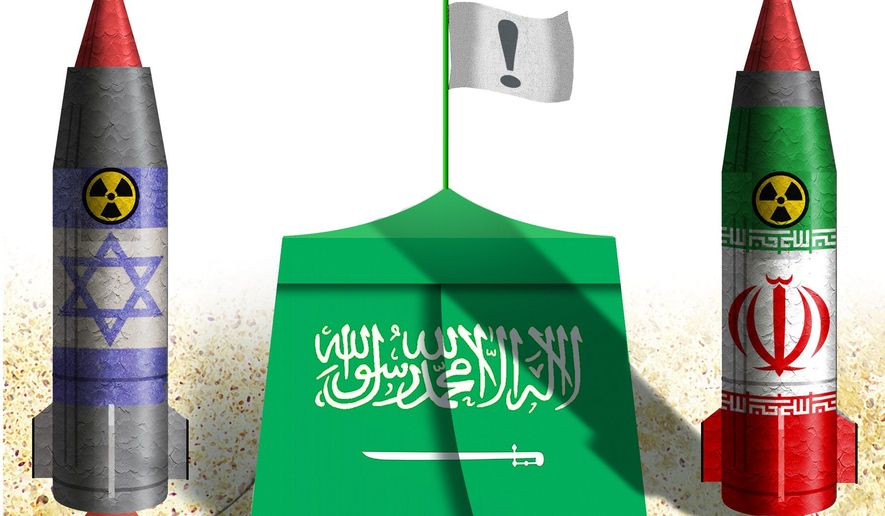OPINION:
Actions speak louder than words.
Perhaps the most troubling reaction to the Iran deal announced last month has been the Saudi announcement that it is moving forward with its plan to acquire its own nuclear weapon — now. No one doubts their ability to do so; after all, it was the Saudis who bankrolled Pakistan’s nuclear program. Egypt and Turkey are almost certain to follow suit. The message from the Saudis is clear: They consider the threat of a nuclear-armed Iran intolerable. They are unwilling to live even a moment beneath the specter of an unanswerable Iranian nuclear strike.
Yet, from the Saudi perspective, a neighboring mortal enemy in possession of a nuclear capability is hardly new. Israel — whose very existence the Saudis have never ceased challenging — has been rumored to possess nuclear weapons since 1966. And though Israel has never confirmed its capabilities, Israel’s nuclear weapons programs has been among the world’s worst-kept secrets since at least 1986, when a former Israeli nuclear scientist named Mordechai Vanunu provided details and photographs to The Sunday Times of London.
Why the sudden panic? Why have the rulers of Saudi Arabia been willing to spend 50 years countering the Israeli bomb with little more than rhetorical challenges in toothless international forums while the mere threat of an imminent Iranian bomb several years hence suffices to drive them to the Pakistani nuclear bazaar?
The answer is simple: Despite all of their vitriolic Jew hatred and opportunistic scapegoating, the Saudis — indeed, all the nations in the Middle East — know full well that the Jewish state means them no harm. The Saudis understand what everyone in the region understands: Israel’s nukes are strictly defensive. Israel developed them as a deterrent, and has never once considered using them in an offensive first-strike capacity. In fact, Israel has always abided by a commitment that it made to the United States not to be the first country to introduce nuclear weapons to the Middle East — formalized in the Eshkol-Komer memorandum of understanding of March 10, 1965.
The Saudis also understand a great deal about the jihadi nature of the Iranian regime, the mullahcracy born of the 1979 Khomeinist revolution — a great deal more, in fact, than either President Obama or Secretary of State John Kerry. The Saudis understand that the Iranian regime combines a revolutionary zeal for global destabilization with an eschatological vision of Shia dominance. Saudi Arabia funded Saddam Hussein during the eight-year Iran-Iraq war of the 1980s; supported opposing militias in the 20-year Lebanese civil war; clashed with Iranian pilgrims during the Hajj in 1987; faced off against Iranian supporters in Bahrain in 2012; stands against Iranian proxies in Yemen today; and experienced numerous conflicts with Iranian oil strategy in the chambers of OPEC. The tension between the fundamentalist Wahhabi strain of Sunni Islam that governs in Saudi Arabia and the supremacist Shia strain of Iran could hardly be greater. Wahhabis view Shiism as apostasy, a crime punishable by death in a culture that is hardly bashful about imposing the death penalty.
The Saudis understand the difference between the Israeli nuclear program, which has promoted regional stability by deterring the Arab states from going to war against Israel, and the Iranian nuclear program, which will destabilize the region by promoting terrorism and proliferation. The Saudis know that Iran is a mortal threat in ways that Israel is not. And they are willing to put their money where their mouth is.
Yes, opposition to this Iran deal is far broader than Israel. The Saudis get it. So do the Egyptians, Jordanians, Kuwaitis and Emirates —all of America’s traditional allies in the region. Why won’t the Americans?
• Jeff Ballabon is a senior fellow at the American Conservative Union Foundation’s Center for Statesmanship and Diplomacy and chairman of the Iron Dome Alliance. Bruce Abramson is a senior fellow at the London Center for Policy Research and director of policy for the Iron Dome Alliance.




Please read our comment policy before commenting.